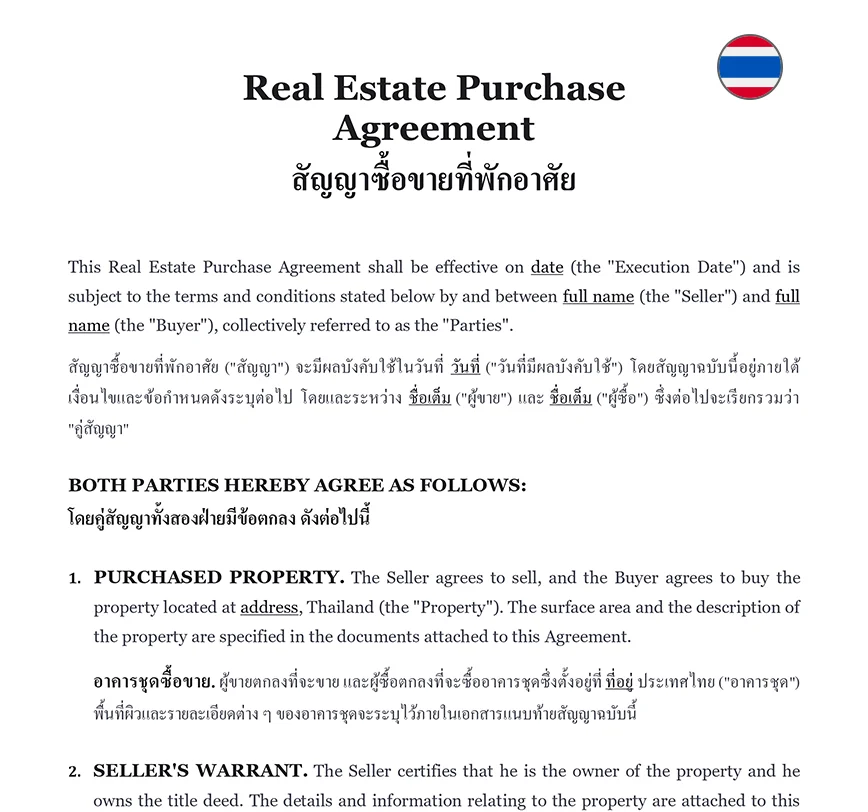Did you know foreign demand for condominiums in Thailand rose by 14% last year, with strict quota enforcement shaping every transaction?
If you are ready to buy condominium unit in Thailand as foreigner in 2025, understanding the updated regulations is more important than ever: only 49% of any building can be foreign-owned, and nominee ownership is now closely scrutinized.

This guide delivers trusted, actionable steps for business owners and professionals who want a secure, fully compliant purchase. Get the clarity needed to navigate documentation, payments, taxes, and future resale, while avoiding costly mistakes.
Key Takeaways
- Foreigners can own up to 49% of a Thai condo, following strict quota and overseas fund transfer rules.
- Always confirm quota availability before making an offer.
- Complete purchases via foreign remittance and obtain a Foreign Exchange Transaction (FET) form for Land Office registration.
- Perform full due diligence with licensed legal or real estate professionals to avoid nominee or unregistered projects.
- Budget 6-7% for fees, including transfer, stamp duty, and taxes.
- Financing is limited; expect 50-70% LTV and extra documentation.
- Top locations for foreign buyers include Bangkok, Phuket, Pattaya, Chiang Mai, and Hua Hin.
- Inheritance and resale must comply with quota rules; otherwise, the property must be sold within a year.
Looking to buy, sell, or lease property in Thailand?
Our team handles registration, title searches, purchase and lease agreements and all property rights.
Table of Contents
-
Legal Rules & Eligibility for Foreigners
-
Condo Buying Process in Thailand
-
Costs, Taxes & Financing 2025
-
Best Locations & Investment Potential
-
Risks, Inheritance & Long-Term Ownership
-
FAQ: Buying Condos in Thailand
-
Conclusion
Legal Rules & Eligibility for Foreigners
Condo Laws & Quotas for Foreign Buyers
Foreigners can legally buy condominium units in Thailand under the Condominium Act (Section 19), but key restrictions apply.
The most important rule is the 49% foreign ownership quota: only up to 49% of a condo building’s sellable area can be foreign-owned.
Foreigners may not own Thai land directly; exceptions are extremely rare and highly regulated. Ownership is limited to the individual condominium unit, never the underlying land.
Key regulatory updates in 2025:
- The 49% quota rule remains unchanged and is firmly enforced.
- Nominee arrangements (where a Thai person or company holds the unit on a foreigner’s behalf) are increasingly investigated and carry serious legal risks.
Clear guidelines can be found at the Thai Land Department.
Who Qualifies & Required Documents
Any foreign national can buy a unit if they:
- Enter Thailand legally (no specific nationality or visa required)
- Purchase within the available foreign quota
Required documents include:
- Passport and valid visa (proof of lawful entry)
- Foreign Exchange Transaction Form (FET), issued when buyers transfer the full purchase price from overseas in foreign currency
- Signed Sale and Purchase Agreement
Be prepared for anti-money laundering checks and proof-of-funds requirements at both the bank and Land Office.
Foreign buyers who follow these steps gain full, registered ownership of their unit within the legal quota.
Careful compliance with these procedures is the foundation for secure, long-term ownership in Thailand’s condominium market.
Condo Buying Process in Thailand
Steps from Search to Ownership Transfer
To buy a condominium unit in Thailand as a foreigner, follow the “Thai Foreigner Condo Purchase Pathway.” This sequence ensures compliance and protects your interests:
- Search for eligible condo projects and confirm the 49% foreign quota is available.
- Engage reputable legal or licensed real estate representation.
- Conduct due diligence: verify title deed, developer registration, and quota status.
After selection:
- Negotiate and sign the Sale and Purchase Agreement.
- Pay the reservation and deposit fees (commonly 2%-10% of sale price).
For payment:
- Remit the full purchase price from abroad in foreign currency.
- Obtain a Foreign Exchange Transaction Form (FET form) as proof.
Ownership is registered at the local Land Office, with the condo Chanote (title deed) transferred in your name.
Legal & Financial Pitfalls to Avoid
Foreign buyers should avoid critical missteps:
- Exceeding the 49% quota (results in denial of freehold ownership).
- Engaging with unregistered condo projects or developers lacking legal status.
- Using nominee structures or Thai proxies, which is illegal and strictly enforced.
Be alert for:
- Fraudulent agents offering suspicious discounts or unofficial financing.
- Hidden costs like high maintenance fees or developer obligations not stated upfront.
Structured due diligence and careful fund remittance are indispensable.
A successful condo purchase depends on accurate documentation, understanding the quota system, and avoiding illegal shortcuts, empowering you to own safely and confidently.
Costs, Taxes & Financing 2025
Total Condo Costs & Taxes in Thailand
When you buy a condominium unit in Thailand as a foreigner, your budget should include several required payments beyond the listed property price.
Common purchase costs include:
- Reservation fee: 1-5% of the unit price, payable upfront to secure the property
- Deposit: 10-15%, usually due within 30 days after reservation
- Transfer fee: 2% of the appraised value, often split between buyer and seller
- Stamp duty: 0.5% of the official sale price if specific business tax is not applied
- Specific business tax: 3.3% if the seller owns the condo for less than five years
- Withholding tax: 1% of the appraised value or contract price, whichever is higher
Ongoing annual expenses are:
- Common area maintenance fees: typically THB 30-70 per sq.m. per month
- Sinking fund: one-time contribution of around THB 500 per sq.m.
Picture this: for a THB 5 million condo, expect all upfront taxes and fees to range between THB 125,000-225,000.
Reference: Latest figures at Bank of Thailand
Financing Options for Foreign Buyers
As of 2025, mortgage access for foreigners has expanded cautiously, but notable restrictions remain.
Available options include:
- Thai commercial banks: Some offer mortgages to foreigners, requiring a valid work permit, passport, proof of income, and a loan-to-value (LTV) ratio typically capped at 50-70%
- Developer financing: Occasional installment plans directly with the developer (often for new or off-plan units)
- Offshore bank loans: Select global banks with Thai branches may offer residential lending
- Joint ventures or partnerships: Alternative structures with locally incorporated companies
Always remit purchase funds from abroad to obtain the required Foreign Exchange Transaction Form (FET) for legal ownership registration.
Present strong proof of income, creditworthiness, and legal compliance for any mortgage application.
Explore more via Bangkok Bank: Foreigner Mortgages
Best Locations & Investment Potential
Top Cities & Areas for Foreign Buyers 2025
Foreigners looking to buy condominium units in Thailand gravitate toward five key markets:
- Bangkok: Wide selection, strong rental demand, and established expat neighborhoods such as Sukhumvit and Sathorn
- Phuket and Pattaya: Resort lifestyle, high tourist traffic, and robust rental yields (often 5-8% per year)
- Chiang Mai: Affordable prices, creative expat community, and a relaxed pace
- Hua Hin and Samui: Seaside living, premium developments, and solid holiday-home demand
Expectation-setting is crucial:
- Bangkok condos may range from THB 80,000 to 300,000 per sqm
- Phuket and Hua Hin average THB 70,000 to 180,000 per sqm
- Foreign quota availability is tracked project by project, with high-demand areas filling fast
The proprietary “Thailand Foreign Condo Attractiveness Index” ranks Sukhumvit in Bangkok, Patong in Phuket, and Nimmanhaemin in Chiang Mai as 2025’s most desirable districts for foreign buyers.
Local Market Trends to Consider
New project launches in Bangkok and the islands are increasing, yet the top-tier foreign quota units consistently sell out first.
Key investor considerations include:
- Building management quality (on-site teams and security)
- Facilities such as pools, gyms, and parking ratios
- Well-known developer track records
Regulatory focus in 2025 remains steady, with enhanced scrutiny on nominee arrangements and clearer foreign quota enforcement.
The Thailand Real Estate Information Center reports that foreign condo transactions grew by 14% in 2024, highlighting continued international demand.
For buyers, aligning unit choice with both personal lifestyle needs and market dynamics will drive long-term satisfaction and maximize investment returns. Always prioritize transparent buildings, updated legal compliance, and neighborhoods with proven rental demand.
Risks, Inheritance & Long-Term Ownership
If Foreign Quota Is Full or Unit Inherited
When the 49% foreign quota is full, foreigners can only lease a condominium unit for up to 30 years rather than own it outright.
Inheritance rules are strict. If a foreigner inherits a unit, these requirements apply:
- The heir must also qualify as a foreign owner
- The unit must remain within the 49% quota
- If these conditions are unmet, the property must be sold within one year
Illicit methods, such as using a Thai “nominee” for foreign purchase, are illegal and subject to enforcement including forced sale and possible penalties.
Thai authorities are cracking down on ineligible ownership through nominee arrangements for 2025.
Leasehold provides long-term rights, but not full ownership. Only freehold purchases offer secure, perpetual ownership for foreigners within quota.
Ownership Rights & Condo Resale Rules
Foreign ownership of condos can face:
- No minimum holding periods, but rapid resale (“flipping”) can attract scrutiny
- Leasehold units can typically be renewed, but renewals are not automatic under Thai law
- Capital gains from resale are subject to withholding tax
To resell, the buyer must qualify under the quota. Selling to Thai nationals is always permitted, but resale to foreigners requires quota space.
Best practices for foreign retirees/investors:
- Consider succession planning early
- Regularly check building quota before resale or inheritance
Key takeaway: Quota limits and strict inheritance rules shape long-term ownership. Early planning protects your property investment and succession options.
FAQ: Buying Condos in Thailand
Foreigners can buy condominium units in Thailand if the building is legally registered and within the 49% foreign ownership quota.
Units must be in a registered project, and all obligations and timelines should be clearly stated in your purchase contract.
Ownership, Residency & Safety Explained
- There is no requirement for foreigners to reside in Thailand to own a condo.
- Owners may visit or rent out their unit but must comply with relevant Thai tax and property regulations.
- Safe ownership depends on following due diligence: validate the foreign quota, confirm builder registration, and avoid nominee arrangements.
Foreigners may legally purchase condos in Thailand, provided they meet quota and fund transfer requirements.
Always review the foreign quota status before making any purchase commitment.
Minimum Funds & Payment Steps
- Thai law does not require a minimum income, but the full purchase price must be remitted from overseas in foreign currency.
- Banks and developers may impose their own qualification criteria during financing.
- Completing the Foreign Exchange Transaction Form (FET) is essential for ownership registration.
Knowing these steps, buyers can confidently enter the Thai property market by ensuring they meet all legal requirements and obtain proper documentation.
Conclusion
Securing a condominium unit in Thailand as a foreigner is not just possible, it’s achievable when you approach the process with informed strategy, legal clarity, and diligent preparation.
Focus on confirming the building’s foreign quota, verifying developer credentials, and ensuring all funds are transferred in compliance with Thai law. Protect your investment with due diligence at every step.
For tailored guidance and seamless navigation through complex regulations, contact us. Themis Partner combines deep legal expertise with market insight to empower your property journey, making your investment efficient, compliant, and fully protected.

